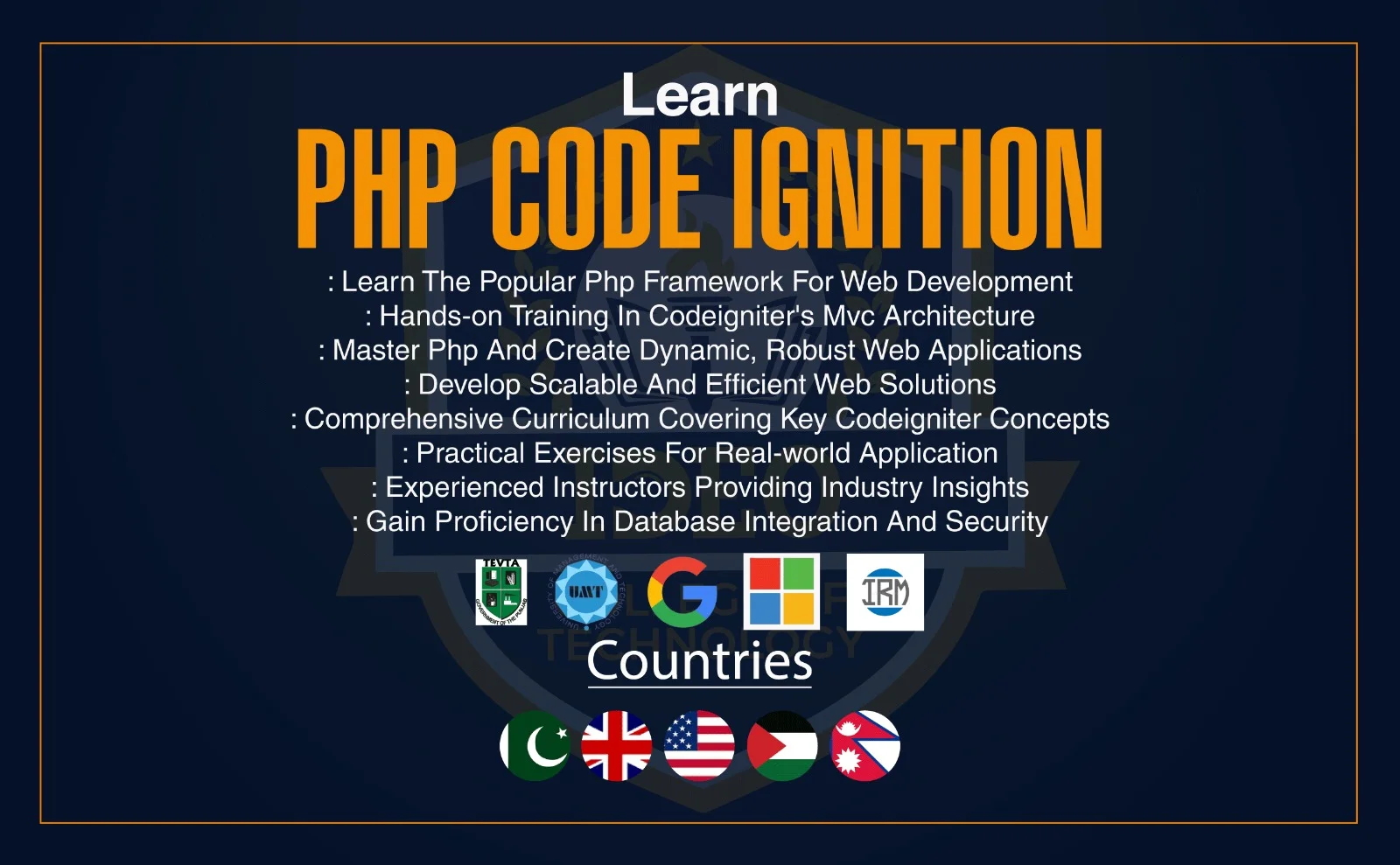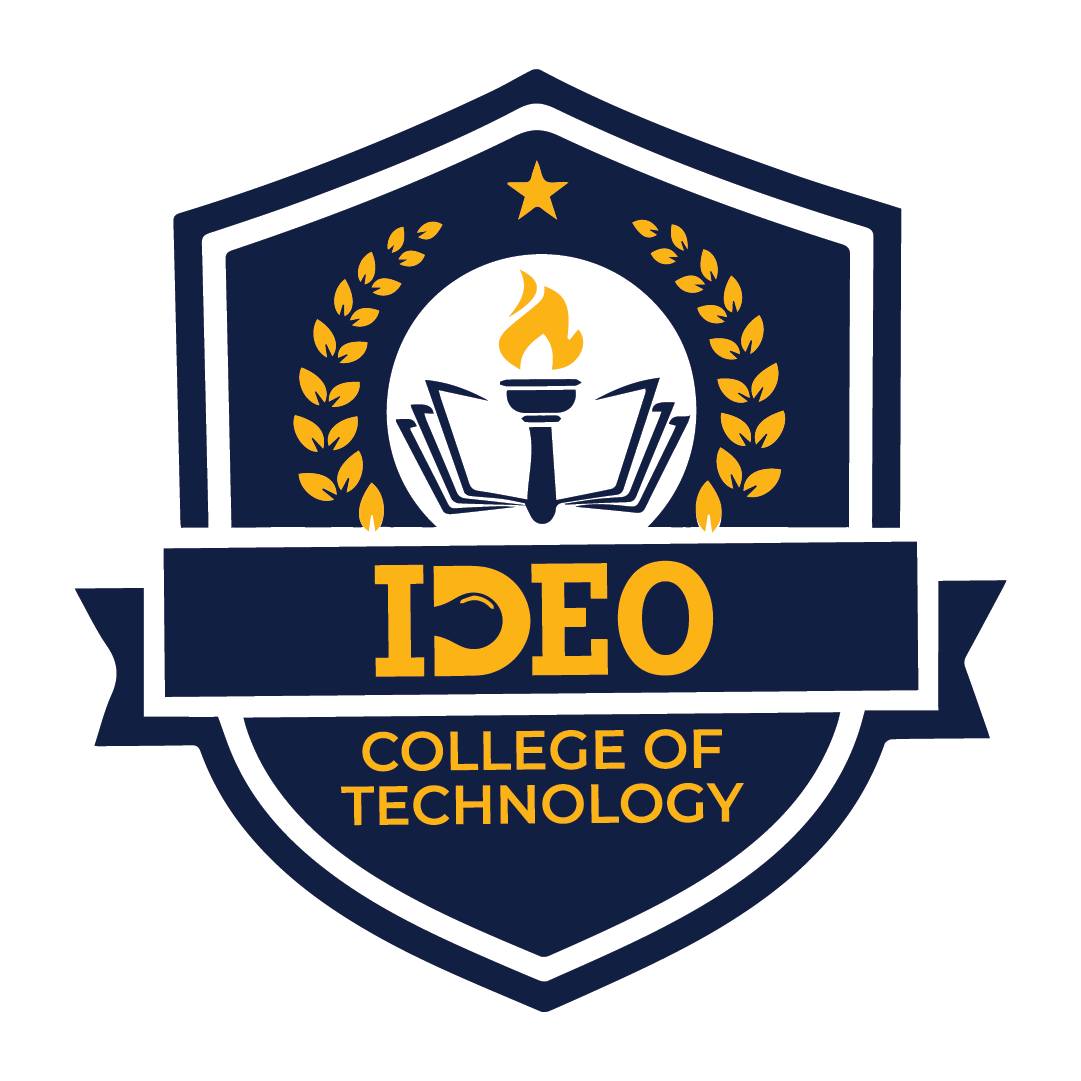PHP Code Ignition Course in Lahore, Pakistan
IDEO College in Lahore offers an immersive PHP Code Ignition Course, empowering students with cutting-edge skills to excel in web development. Elevate your expertise with industry-relevant training for a successful career in PHP programming.
Saturday and Sunday
6:00 pm to 08:00 pm
Duration: 2 months
Rs: 15,000/person

What’s included in the PHP Code Ignition Course in Lahore, Pakistan | IDEO College
Introduction
Welcome to Ideo College, where you will begin your path to understanding PHP programming using the CodeIgniter framework. Our comprehensive course has been deliberately crafted to meet the needs of both novice and experienced developers looking to upgrade their abilities.
Why Ideo College for PHP Code Ignition?
- Expert Guidance: Our instructors bring a wealth of industry experience, guiding you through the intricacies of PHP and CodeIgniter with practical insights and real-world examples.
- Curriculum Excellence: Our course structure is carefully curated, covering PHP fundamentals, CodeIgniter specifics, database integration, security protocols, and performance optimization to provide a holistic understanding.
- Hands-On Projects: Learning by doing is our mantra. Engage in hands-on projects and assignments that simulate real-world scenarios, reinforcing your learning and boosting your confidence.
- Career Advancement: Beyond technical expertise, we focus on your professional growth. Benefit from career support services, including interview preparation, resume building, and industry networking opportunities.
Detailed Course Modules:
1. Introduction to PHP and CodeIgniter:
Explore the fundamental concepts of PHP and the architectural nuances of CodeIgniter.
2. Setting Up Environment:
Step-by-step guidance on setting up the development environment ensures a seamless start to your learning journey.
3. Fundamentals of CodeIgniter:
Delve deep into the Model-View-Controller (MVC) architecture, understanding the role of each component in developing robust applications.
4. Database Integration:
Practical sessions on integrating databases, performing CRUD (Create, Read, Update, Delete) operations, and managing data efficiently.
5. CodeIgniter Libraries and Helpers:
Harness the power of CodeIgniter’s libraries and create custom helpers, amplifying the efficiency of your codebase.
6. Security and Performance Optimization:
Comprehensive coverage of security measures, best practices, and techniques for optimizing CodeIgniter applications.
7. Real-time Projects:
Apply your newfound knowledge to real-world projects, refining your skills under expert guidance and mentorship.
Course Outline:
Introduction to PHP Programming
- Understanding the basics of PHP
- Exploring the significance of PHP in web development
Overview of CodeIgniter Framework
- Introduction to the CodeIgniter framework
- Advantages and applications of CodeIgniter in web development
Setting Up the Development Environment
- Installation and configuration of PHP and CodeIgniter
- Setting up the integrated development environment (IDE)
Understanding MVC Architecture in CodeIgniter
- In-depth exploration of Model-View-Controller architecture
- Implementing MVC in CodeIgniter for structured application development
Routing and Controllers in CodeIgniter
- Configuring routes for effective URL mapping
- Creating and managing controllers for application logic
Database Integration in CodeIgniter
- Connecting and configuring databases with CodeIgniter
- Implementing CRUD operations (Create, Read, Update, Delete) with databases
Working with Models and Views
- Creating models to interact with databases
- Building dynamic views for user interface presentation
Form Handling and Validation
- Implementing forms in CodeIgniter applications
- Validating form data for security and accuracy
CodeIgniter Libraries and Helpers
- Utilizing built-in libraries for enhanced functionality
- Developing custom helpers to streamline tasks
Session and Cookie Management
- Managing user sessions and cookies in CodeIgniter
- Implementing secure session handling techniques
File Uploading and Handling
- Uploading and manipulating files in CodeIgniter
- Implementing file-handling features for user interaction
Security Best Practices in CodeIgniter
- Implementing security measures to protect against common threats
- Handling input data securely and preventing vulnerabilities
Optimizing CodeIgniter Applications
- Techniques for optimizing performance and speed
- Caching mechanisms to improve application responsiveness
RESTful APIs with CodeIgniter
- Creating RESTful APIs for seamless integration
- Consuming APIs and handling responses within CodeIgniter
Working with Third-Party APIs
- Integration of third-party APIs for enhanced functionality
- Implementing API authentication and data retrieval
Debugging and Error Handling
- Identifying and debugging errors in CodeIgniter applications
- Effective error handling strategies for seamless user experience
Version Control and Deployment
- Managing CodeIgniter projects using version control systems
- Deployment strategies for CodeIgniter applications
Project Management in CodeIgniter
- Planning, executing, and managing projects effectively
- Applying CodeIgniter principles to project development
Testing and Quality Assurance
- Implementing testing methodologies for CodeIgniter applications
- Ensuring quality and reliability through systematic testing
Real-Time Project Work
- Hands-on application of acquired knowledge in real-world scenarios
- Developing full-fledged web applications using CodeIgniter
CodeIgniter Best Practices and Tips
- Best practices for efficient and maintainable CodeIgniter code
- Tips to enhance productivity and code readability
Advanced Topics in CodeIgniter
- Exploring advanced concepts like HMVC (Hierarchical Model-View-Controller)
- Using CodeIgniter for complex application development
CodeIgniter Community and Resources
- Leveraging the CodeIgniter community for support and learning
- Exploring additional resources for continuous skill enhancement
Capstone Project and Graduation
- Undertaking a capstone project to showcase acquired skills
- Graduation and certification upon successful completion
Basics of PHP Code Ignition Course: Exploring the Fundamentals
Introduction to PHP:
- Understanding the role and significance of PHP in web development.
- Exploring PHP syntax, variables, data types, and basic operations.
CodeIgniter Framework Overview:
- Introduction to the CodeIgniter framework and its purpose in PHP development.
- Differentiating CodeIgniter from other PHP frameworks and understanding its advantages.
Setting Up Development Environment:
- Step-by-step guidance on installing and configuring PHP and CodeIgniter.
- Establishing a functional development environment for seamless learning.
MVC Architecture:
- Grasping the Model-View-Controller (MVC) architectural pattern and its importance.
- Understanding how MVC is implemented in the context of CodeIgniter.
Routing and Controllers:
- Configuring routes for effective URL handling within CodeIgniter.
- Creating and managing controllers to control application flow and logic.
Database Integration:
- Connecting and configuring databases with CodeIgniter for data handling.
- Implementing basic CRUD (Create, Read, Update, Delete) operations using CodeIgniter.
Views and Models:
- Understanding the role of views in user interface design within CodeIgniter.
- Creating models to interact with databases and manage data retrieval.
Form Handling and Validation:
- Implementing forms and managing form data in CodeIgniter applications.
- Validating user input for security and data accuracy purposes.
CodeIgniter Libraries and Helpers:
- Utilizing CodeIgniter’s built-in libraries to enhance functionality.
- Creating and using custom helpers to streamline development tasks.
Security Measures in CodeIgniter:
- Implementing security measures to protect against common web vulnerabilities.
- Handling user inputs securely and preventing security threats.
Performance Optimization:
- Techniques and best practices to optimize CodeIgniter applications for speed and efficiency.
- Caching mechanisms and performance-enhancing strategies.
Debugging and Error Handling:
- Identifying and resolving errors in CodeIgniter applications.
- Effective strategies for error handling and debugging.
Enroll Now and Ignite Your PHP Skills!
At Ideo College, we take pride in nurturing talent and fostering a learning environment that propels you towards excellence. Join us to acquire in-demand PHP and CodeIgniter skills, empowering yourself to thrive in today’s competitive tech landscape.
Best PHP Code Ignition Course in Lahore, Pakistan
1. Introduction to PHP Code Ignition
– Overview of PHP Code Ignition framework.
– Importance and advantages of using PHP Code Ignition for web development.
2. Setting Up the Development Environment
– Installing and configuring PHP Code Ignition.
– Setting up a local development server for testing.
3. Understanding MVC Architecture
– Explaining the Model-View-Controller (MVC) design pattern.
– How PHP Code Ignition implements MVC for structured development.
4. Routing and URL Handling
– Configuring routes for clean and SEO-friendly URLs.
– Handling dynamic routes and parameters.
5. Database Interaction with ORM
– Integrating databases using Object-Relational Mapping (ORM).
– Performing CRUD operations with PHP Code Ignition’s built-in database tools.
6. Templating and Views
– Creating dynamic and reusable views using PHP Code Ignition.
– Implementing layouts and partials for efficient code organization.
7. Middleware and Authentication
– Understanding middleware and its role in request processing.
– Implementing user authentication and authorization.
8. RESTful API Development
– Designing and building RESTful APIs with PHP Code Ignition.
– Handling HTTP methods, status codes, and authentication for APIs.
9. Security Best Practices
– Addressing common security concerns in web development.
– Implementing measures like input validation, output escaping, and CSRF protection.
10. Testing and Debugging
– Writing unit tests for PHP Code Ignition applications.
– Utilizing debugging tools and techniques for troubleshooting.
Address
Office # 01, 3rd Floor Arfa Software Technology Park, Lahore
Faisal Town Branch: Building 291 Block C Faisal Town lahore
Phone
Call
03008642269
03035555130
923035555138
Follow Us
info@ideocollege.com
